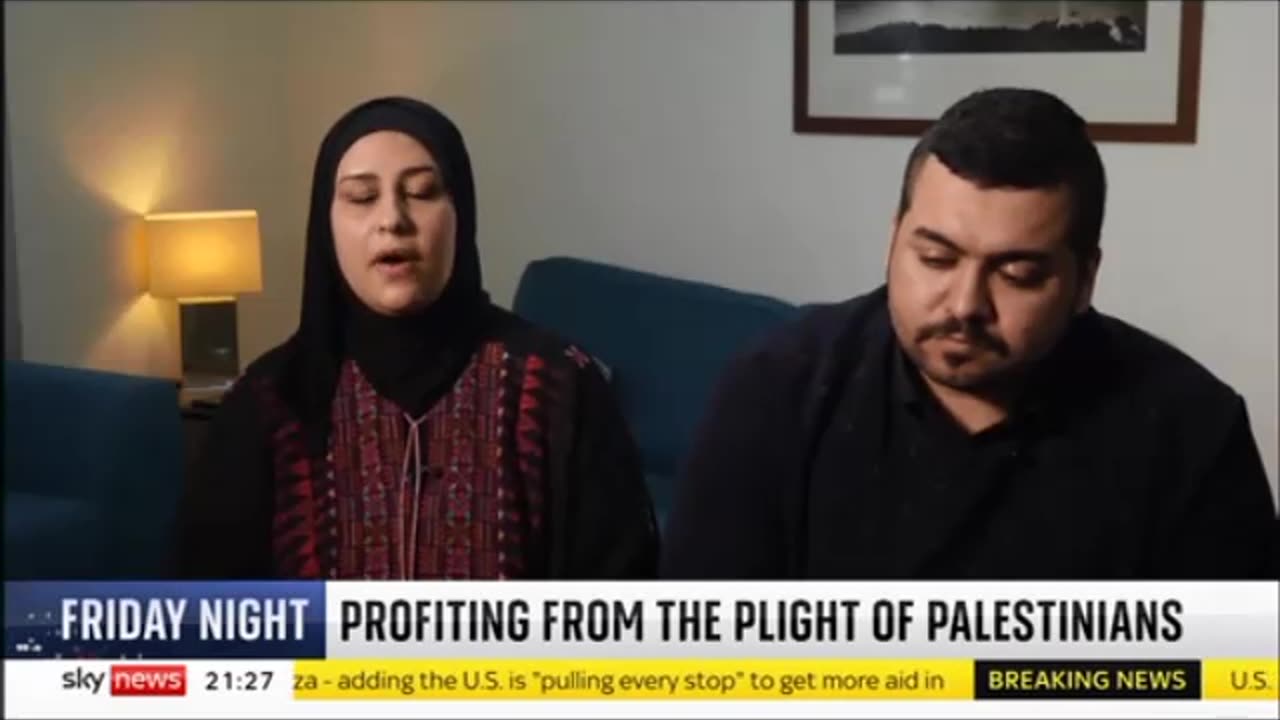Premium Only Content

Egypt charging $5k per person to leave Gaza genocide zone. Profiting from the Plight of Palestinians
Egypt: Meet Ibrahim al-Organi, the Sinai tribal leader under scrutiny over Gaza war
https://www.middleeasteye.net/news/egypt-ibrahim-organi-sinai-tribal-leader-gaza
From holding police officers hostage to becoming the richest person in Egypt's Sinai Peninsula, the militia chief has had a meteoric rise
Published date: 1 March 2024
About 15 years ago, Sinai tribal leader Ibrahim Organi was in jail, suffering what he described as “severe torture” by senior police officers.
“Every day, at 6 am, they would take me out of the cell, blindfold me, and release six trained dogs without claws, with garbage tied to their mouths. The dogs would then approach and intimidate me while I had my eyes closed, unable to see anything,” he told Rose al-Yusuf magazine, in a now-deleted interview.
It was a few months before millions of Egyptians took part in nationwide protests that ended with the resignation of then-president Hosni Mubarak. The protests were partly triggered by several documented incidents of torture at the hands of police and security officers.
“One day, they brought three prisoners on death row, dressed them in women's nightgowns, and invited all detainees to watch them. They told me it would be my turn the next day and attempted to do the same to me," he said.
Organi said he suffered a stroke due to torture and ended up at a hospital, partially paralysed.
Organi was serving time in jail for kidnapping dozens of police officers after an incident in which his brother was killed by an officer at a checkpoint in Egypt's Sinai Peninsula. He was released about two years later.
The same man, now 50 years old, is currently considered one of the closest allies to President Abdel Fattah el-Sisi and the Egyptian military. He owns a gigantic business empire spanning construction, quarry mining, travel, hospitality, and private security.
Since the Gaza war broke out on 7 October, during which Israel imposed a strict blockade on the Palestinian enclave, Organi has wielded significant influence on the movement of people and goods between Gaza and neighbouring Egypt through his companies.
There have been reports that his companies, some of which are part-owned by the Egyptian security services, have even demanded bribes to allow aid into Gaza and people out of the enclave.
Middle East Eye asked the Organi Group and the Egyptian State Information Service for comment but did not receive a response before publication.
Along with his business empire, he also heads a controversial Sinai militia known as the Union of Sinai Tribes, which has worked closely with the Egyptian army in its fight against a local Islamic State group affiliate but now faces an unknown future after the official end of the military operation.
Organi has come under increasing media scrutiny since the Gaza war. One independent outlet has labelled Sinai as the “Organi Peninsula”, reflecting his widespread influence in the northeastern region. Another portrayed him as the “Hemeti” of Egypt, drawing analogies between him and the Sudanese warlord Mohamed Hamdan Dagalo.
But how influential is Organi? And does he really have the potential to emerge as a rival to the Egyptian army as Hemeti has done in Sudan?
MEE explores Organi’s history and how he rose to prominence in Egypt.
Who is Ibrahim al-Organi?
Ibrahim Gomaa Salem Hassan al-Organi was born in Sheikh Zuweid in northern Sinai on 4 December 1974. According to his ID, his official address is in Abu Tawila village in Sheikh Zuweid.
He hails from the Tarabin tribe, one of the three largest tribes in North Sinai, the two others being Sawarka and Romaylat.
Currently, he heads the Union of Sinai Tribes, a paramilitary group mostly made up of members of his own tribe.
According to a Sinai tribal source, Organi started his career as a taxi driver in northern Sinai, using his pickup truck.
He was also engaged in lucrative smuggling activities to Gaza and Israel, said the source. Organi is also believed to have earned money by charging businessmen who used his tribe’s area for construction projects.
The Tarabin, Sawarka, and Romaylat were the subject of a ferocious security crackdown in the aftermath of bombings that hit several tourist destinations in south Sinai between 2004 and 2006.
The arrest campaign targeted several thousand tribesmen, as well as some women who were detained to force their male relatives to surrender themselves.
The crackdown prompted the tribes to organise a series of protests and sit-ins in April and July 2007. The protest movement at the time was referred to in the media as the "We Want to Live" movement ("Wedna Nieesh" in Arabic).
Then in his early thirties, Organi participated in the protests and sit-ins. But he also simultaneously acted as a mediator between the security services and the tribes, along with two other more influential members of his Tarabin tribe at the time, Mousa al-Deleh and Salem Lafy, the Sinai source told MEE.....
-
 2:23:55
2:23:55
Barry Cunningham
7 hours agoPRESIDENT TRUMP IS NOT PLAYING AROUND...AND THE LIBNUTS CAN'T STOP HIM!
54.7K48 -
 22:02
22:02
Stephen Gardner
12 hours ago🔥JUST IN: Trump BETRAYAL plot EXPOSED!
75.6K246 -
 38:32
38:32
The Why Files
21 days agoThe Real CIA Vol. 1: 693 Pages of Secret Crimes
87.7K58 -
 49:12
49:12
MattMorseTV
9 hours ago $12.73 earned🔴Zelenskyy is NOT HAPPY about Trump’s NEW DEAL.🔴
94.1K134 -
 1:03:49
1:03:49
Warren Smith - Secret Scholar Society
4 days ago"You are on the brink" - My Conversation with Nick Fuentes
69.7K61 -
 8:05
8:05
Tactical Advisor
11 hours agoNEW Best Budget AR15 | PSA Guardsman (FIRST LOOK)
68.1K23 -
 8:55
8:55
Warren Smith - Secret Scholar Society
3 days agoMatt Walsh EXPOSES a Leftist's Lie So Badly She Flees the Stage
59K32 -
 25:05
25:05
Digital Social Hour
10 hours ago $4.92 earnedScott Jennings: The Fight for Free Speech: Scott Jennings Speaks Out
46.8K13 -
 1:29:24
1:29:24
Steve-O's Wild Ride! Podcast
3 days ago $3.92 earnedDarby Allin Risked His Life And Career To Climb Mt Everest | Wild Ride #262
44.2K -
 49:33
49:33
Jeff Ahern
11 hours ago $7.29 earnedThe Sunday Show with Jeff Ahern
47.8K9